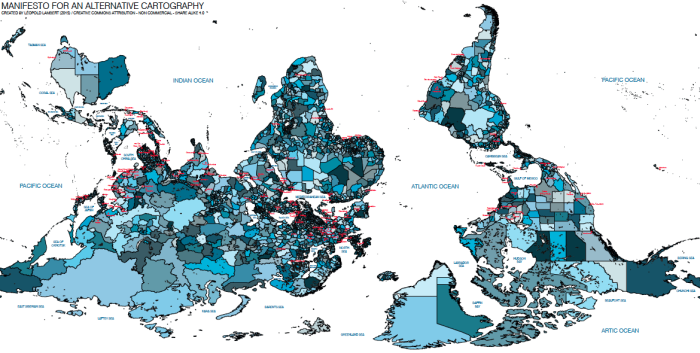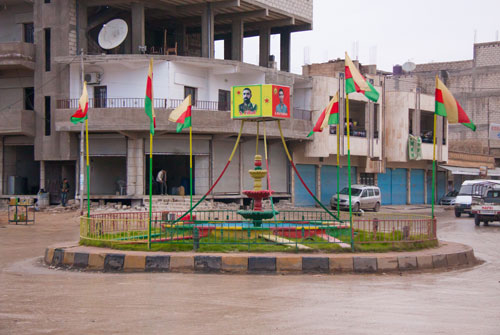Re-Thinking the Concept of the Nation

Nowadays national states all around the globe are struggeling with problems basically deriving from their classical structures and often immense sizes. Matters of integration, of real democracy, of the dispersion of power and of the exposure to minorities are in one way or the other on the agenda in many regions of the world. And just very few governments are able to find proper solutions for these challenges so far.
An impulse on re-thinking the concept of the strong, absolute nation comes of all things from an old and centralised one in central Europe: The french architect and writer Leopold Lambert has been working with cartographic materials for quite a while. In his new work „Maps // Manifesto for an Alternative Cartography“ he picks up the idea of not longer existing national states and suggests to devide the world into small sections of government.
Lamberts world map shows fragmented landmasses which seem to not even notice current international boarders, but are devided according to smaller administrative units such as municipalities. Just like the ancient Greek polis structures, the system he imagines is based on regional responsibility and autonomy. While he coloured the landmasses in different shades of blue, the sea remains white on his map, which is furthermore displayed up-side-down. „This map does not try to replace the conventions by others, but simply to offer an alternative among an infinity of potential others to them”, Lambert states.
[widgetkit id=18566]
But still cities remain fundamental for the new world structure, Lambert visualises. On his map not only the hundred most populated ones are to be found, but also the hundred most frequently visited ones. The argument behind this idea is smart: If landscapes are not ruled by centralised governments anymore but by regional forces, the individual is not really a citizen of a fixed country any longer. Instead, its „nationality“ would change with the individual moving. By spending holidays in Las Vegas or making a pilgrimage to Mecca, persons would become temporary citizens of these areas, holding the same rights and duties as the old-established population.
In Lamberts argumentation this concept could save the world population from living in unsatisfying national states which are about to lose themselves in bureaucratic structures (just like the European Union, which used to be celebrated for peacefully connecting states, but nowadays is busy with regulating the amount of cuvarture of every sold cucumber instead of developing fair, human strategies on handling the entering refugees). And his approach could prevent governments of losing further track of the real needs of their populations.
A region in which artificially constructed national states are resulting in war and violence at the moment is the Middle East. There, colonial rulers as Greatbritain and France set up borders regardless any ethnicities. Until today groups of most diverse traditions, religions and origins are penned up in national states such as Syria, Iraq and Iran, leading to constant conflicts and chaos.
One folk spread over four national states in the Middle east are the Kurds, mistreated as minority in every one of these countries. But in one area belonging to the Syrian state officially, the Kurds used the vacuum resulting from the fights between Assad’s troops, their opponents and Daesh: In Rojava, Western Kurdistan, right between Turkey, Iraq and Syria a democratic, regional government as Leopold Lambert imagines it, is already existing.
[widgetkit id=18572]
In Rojava an autonomous government took over power during the Arab Spring in 2012. It claims responsibility only for this area and set up a social contract between all the groups living in the region – Kurds, Arabs, Assyrians, Chaldeans, Arameans, Turkmen, Armenians and Chechens – last year:
„In pursuit of freedom, justice, dignity and democracy and led by principles of equality and environmental sustainability, the Charter proclaims a new social contract, based upon mutual and peaceful coexistence and understanding between all strands of society. It protects fundamental human rights and liberties and reaffirms the peoples’ right to self-determination. Under the Charter, we, the people of the Autonomous Regions, unite in the spirit of reconciliation, pluralism and democratic participation so that all may express themselves freely in public life.“
As Jonas Staal, a Dutch artist, who explored the area for plenty of time, puts it, six principles are fundamental for the autonomous region of Rojava: radical secularity, the representation of every ethnicity in public institutions (in order to avoid any cultural hegemony), gender equality, the reduction of centralized administrative structures to an absolute minimum, democratic confederalism and „social ecology“, which „attempts to define an understanding of power based on principles of coexistence and radical diversity, instead of unification and assimilation“.
Although not recognised by the international community, people in Rojava constructed a modern Polis-system in their area, trying to defend diversity and direct democracy in an instable region. Like this, Leopold Lamberts vision of small-section government comes true exactly in this part of the world, where no one would have expected it to emerge.

